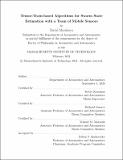| dc.contributor.advisor | Sertac Karaman. | en_US |
| dc.contributor.author | Miculescu, David. | en_US |
| dc.contributor.other | Massachusetts Institute of Technology. Department of Aeronautics and Astronautics. | en_US |
| dc.date.accessioned | 2021-05-24T19:53:39Z | |
| dc.date.available | 2021-05-24T19:53:39Z | |
| dc.date.copyright | 2021 | en_US |
| dc.date.issued | 2021 | en_US |
| dc.identifier.uri | https://hdl.handle.net/1721.1/130744 | |
| dc.description | Thesis: Ph. D., Massachusetts Institute of Technology, Department of Aeronautics and Astronautics, February, 2021 | en_US |
| dc.description | Cataloged from the official PDF of thesis. | en_US |
| dc.description | Includes bibliographical references (pages 145-158). | en_US |
| dc.description.abstract | Rapid development and deployment of large-scale swarms of robotic agents motivates the need for computationally-efficient algorithms for monitoring the state of the swarm. This dissertation is concerned with the state estimation of swarms via tensor methods, specifically the Tensor-Train (TT) decomposition. Existing nonlinear filtering algorithms for swarms, such as particle-based methods, suffer from particle degeneracy when scaling to larger swarms and higher dimensional state-spaces. Tensor-based methods such as the TT decomposition have the potential to alleviate the curse of dimensionality via computationally-efficient multi-linear algebra methods in "low-rank" problem instances. Our first contribution is a class of algorithms allowing for the efficient reconstruction of the state of agents in a swarm in a Bayesian manner. Specifically, we consider swarms under the standard multi-target tracking model, i.e., independent agents with identical dynamics. | en_US |
| dc.description.abstract | We demonstrate that the traditional Probability Hypothesis Density (PHD) filter can be efficiently implemented in the TT format for problems settings in which the relevant parameters have efficient TT approximations. We then generalize our TT-based algorithms to swarm problems with interacting agents via the Gas-kinetic (GK) PHD filter. Specifically, we demonstrate that the GK-PHD filter may be efficiently implemented via the TT format. We analyze the convergence and computational complexity of our TT-based algorithms. Our second contribution is a class of efficiently implemented controllers for a team of mobile sensors performing swarm state estimation guided by an information-theoretic objective. Specifically, certain costly quantities arising from the traditional binary measurement model for sensors is implemented efficiently in the TT format. We analyze the convergence and computational complexity of our TT-based implementations. | en_US |
| dc.description.abstract | Furthermore, we propose a novel controller based on a tertiary sensor model and describe its efficient implementation in the TT format. | en_US |
| dc.description.statementofresponsibility | by David Miculescu. | en_US |
| dc.format.extent | 158 pages | en_US |
| dc.language.iso | eng | en_US |
| dc.publisher | Massachusetts Institute of Technology | en_US |
| dc.rights | MIT theses may be protected by copyright. Please reuse MIT thesis content according to the MIT Libraries Permissions Policy, which is available through the URL provided. | en_US |
| dc.rights.uri | http://dspace.mit.edu/handle/1721.1/7582 | en_US |
| dc.subject | Aeronautics and Astronautics. | en_US |
| dc.title | Tensor-train-based algorithms for swarm state estimation with a team of mobile sensors | en_US |
| dc.type | Thesis | en_US |
| dc.description.degree | Ph. D. | en_US |
| dc.contributor.department | Massachusetts Institute of Technology. Department of Aeronautics and Astronautics | en_US |
| dc.identifier.oclc | 1251896673 | en_US |
| dc.description.collection | Ph.D. Massachusetts Institute of Technology, Department of Aeronautics and Astronautics | en_US |
| dspace.imported | 2021-05-24T19:53:39Z | en_US |
| mit.thesis.degree | Doctoral | en_US |
| mit.thesis.department | Aero | en_US |
